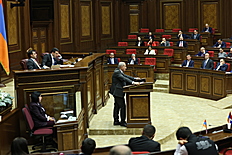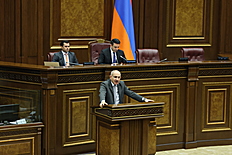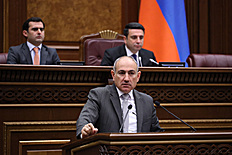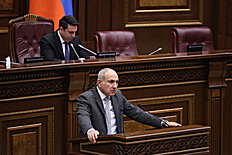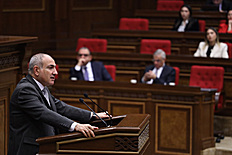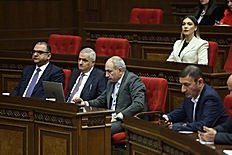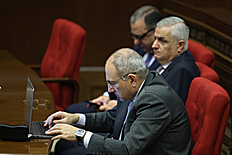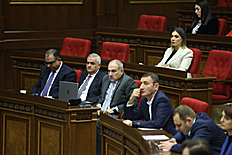Statements and messages of the Prime Minister of RA
I am convinced that we are the Government, the parliament, which will have the opportunity to say: ''Here we have guaranteed the existence of the statehood of the Republic of Armenia for the next century''. Prime Minister
more 8 photos
Honorable President of the National Assembly,
Honorable Vice-President,
Honorable MPs,
Honorable Cabinet members,
Thank you for the earnest and interesting discussions on the state budget of the Republic of Armenia. And I would like to look at the budget from a different perspective, which I also proposed during the discussions at the committee level.
In essence, the idea is that when we discuss the state budget, we should once again state that the budget is a very important feature of statehood and sovereignty. I will not tire of repeating it, bringing the following parallel and comparison. The government consists of 14 members. How do the 14 members of the Government differ from any other 14 people who are citizens of the Republic of Armenia, because in Armenia it is possible to compile a list of tens of thousands of 14 people?
The government differs from the other 14 people only in one thing: these 14 people manage the largest financial resources and the largest financial instrument in the country, which is the state budget of the Republic of Armenia. And I would like us to look at the state budget with this logic.
Of course, at the end of my speech I will also try to look at the opposite logic, because, yes, when saying state, statehood, independence, sovereignty, one of the first things to understand is the state budget, but the state budget is also an integral part of the family budget of each of us. I want to repeat again that there is not even a single person in the Republic of Armenia for whose personal needs funds from the state budget of the Republic of Armenia are not spent. There is absolutely no such person, there is not a single person in the Republic of Armenia, and not only a citizen and resident of the Republic of Armenia, but also a person who is not a citizen of the Republic of Armenia but resides in the Republic of Armenia, for whose personal needs a specific amount of money is not spent from the state budget of the Republic of Armenia. Therefore, the state budget of the Republic of Armenia is an integral part of the family budget of each citizen of the Republic of Armenia. And, therefore, we all need to deepen this perception more and more, that the state budget of the Republic of Armenia is also, on the other hand, the collective family budget of all of us, and this is the most important attribute and characteristic of the state and statehood.
In this context, I want to share some impressions and ideas with you, which may seem unrelated to the state budget, but in my opinion, it has a very direct connection, at least, with the state and statehood. I have raised this question many times and have also spoken publicly about it, which is very important for us, especially in the context of the task we have set, in the context of the strategic issue of national security. What is the durability of the statehood of the Republic of Armenia? It is very important for us to understand how the world perceives us. This may seem like a very simple question, but it has very important layers and nuances.
When I was recently trying to summarize my impressions of the past 6.5 years, I came to the following inevitable conclusion: Our average statistical image in the world can be formulated as follows: the world perceives us as a nation-martyr. And this is the conclusion of the well-founded impressions I have received, I have thought about it a lot. And, in general, the message that we want to convey to the world is that we consider the greatest mission of our Government to be that we overcome the status of being a nation-martyr. In general, I must say that in our reality this agenda is not new, regardless of the extent it had been formulated. And our average statistical response to this situation has been and in some sense has continued to be the following: the best way to overcome the nation-martyr formula is the nation-army. But I must also state that I am not convinced, at least, that this is the correct response to the first formula, because my reflections and thoughts lead to the conclusion that the nation-army is in the logic and continuation of the nation-martyr formula.
We have talked a lot and continue to talk about what our perception of the army or nation-army or state-army should be, but I want to emphasize again that the nation-army perception is a continuation of the nation-martyr perception and stems from it, because if you position yourself as a nation-army, you inevitably generate other armies against you.
We talk a lot about that we must have a strong army, and this is the right agenda, and we must continue to implement this agenda. But again, I want us to ask ourselves: how strong an army do we want to have and stronger than who? Because as I have had the opportunity to say from this rostrum, we must be very clear on this issue and exchange and share direct and sincere messages with our people.
Stronger than who? I don't want to give examples of specific countries now, but we need to answer that question, and how many joint armies should we be stronger than? Well, we can set a goal that we can and should have an army stronger than the army of one country, and if our problem is with two countries, very good, we can set a goal that we should have an army stronger than the armies of the two countries, so-called hostile countries. Very good, but if it turns out that our problem is with three countries, and if it turns out that our problem is with four countries, and if it turns out that our problem is with five countries, and if it turns out that our problem is not only with our enemies, but also with our friends, how much stronger should our army be and compared to who? In other words, this is a problem that we must address and must respond to, but why am I saying this? I am saying this, including analyzing our approaches, including our mistakes, which I will touch on later, but I don't want us to reach an impasse, I also want to offer a solution.
I am saying that in order to overcome the nation-martyr, nation-army formulas, we need to adopt another, completely different logic, simply the logic of the state, which acts only and only, exclusively in accordance with its own interests. That is, the state has a specific territory, a specific zone of responsibility, a specific internationally recognized territory and acts only and only in accordance with the interests of that territory, only and only, do you understand, only and only, in accordance with the interests of its own area of responsibility.
And what are those interests? I have previously had occasion to address this in order to share my conviction that that interest is economic development or development in general. Therefore, the Republic of Armenia should act only and only in accordance with the interests of its own economic development, which, by the way, is not a simple topic, it has dozens of layers: foreign policy, domestic policy, geopolitical, socio-economic, etc., because some people may think that I am making this issue primitive, on the contrary, I am making the issue more complicated, because this is a very complex approach, and secondly, the state should limit itself to the declared and accepted rules and laws of international relations.
I am saying this especially now, when it seems that all established international laws and rules are being violated everywhere, by whoever, wherever and however one wants. We talk a lot about the fact that we need to give an asymmetrical reaction to our problems. In my opinion, this is exactly the asymmetrical reaction, when everyone violates the accepted rules of international relations in every possible place, we need to position ourselves as a state that declares itself and limits itself to acting in accordance with internationally recognized, accepted rules.
But I don't want to leave the idea unfinished here and I want to return to the army. It is with the presence of these conditions that the army, the strong and combat-ready army we think of, can be effective. This means creating a security system, in which, as I said, the army is not on the front line. There are buffers before the army, what are those buffers? For example, economic interdependencies, before which there is another buffer, what is that buffer? International rules, about the violations of which everyone and everywhere complains today, but if everyone and everywhere complains about their violations, it means that being loyal to those rules, maintaining that loyalty is a positive practice, and that positive practice forms another buffer before the army.
And it is under these conditions that the agenda of having a strong army can be legitimate, the agenda of having a strong army can be justified, and the agenda of having a strong army can ensure security as one and just another link in the security chain.
In general, the topic of emigration is rightly discussed a lot in this hall and in our society. I think that we need to face a very simple truth on this issue as well. You know, since the beginning of the 90s we have been constantly talking about emigration, emigration, emigration, and we cite all sorts of reasons for emigration, starting from injustices, ending with social injustices, legal injustices, the poor state of infrastructure, the business environment, and so on, and all of them are true. But also let me share with you my impression that the reasons we have listed so far, all of which are true, which are accepted to be spoken about publicly, and there are no restrictions to do so, all of these are, yes, reasons, but they are 10, 15, at most 20 percent of the reasons.
Dear guests,
Dear people,
Let us finally admit that the reasons for emigration are 90 percent related to our regional policy. The first, second, third, fourth, fifth, sixth, seventh, eighth, ninth, tenth and eleventh reasons for emigration are our conflictual relations with our environment. Yes, the twelfth may be social hardship, but let us also say that a large part of these social hardships is related to the conflictual environment, the thirteenth may be the lack of justice. But let us admit that this lack of justice is also, in some places and to a certain extent, related to the conflictual environment.
We have not spoken about the intra-society, intra-Armenian behavior, status, civil status of people who took on a great deal of responsibility in that conflict environment. We have not spoken about that. Objectively. I want you to understand correctly, I am not targeting anyone now. But we must look each other in the eye and say that, yes, that our esteemed... I referred to it in the previous session, when our colleagues were saying that I was discrediting the heroes. I was responding, which heroes, those who were entering with a machine gun, telling to leave this or that property, this no longer belongs to its owner?
We must admit that because of this situation, how many citizens of the Republic of Armenia have left, saying that there is no justice in this country, there is no future in this country, etc. I think that the most quoted title of the political intellectual elite of the Republic of Armenia is at least Hovhannes Tumanyan's article, which is entitled "We are not sincere."
Our esteemed colleagues from the opposition from time to time in this hall, outside the hall, on social networks constantly return to my famous sentence: “Artsakh is Armenia and that’s it,” and constantly bring it to the political stage. I have to address it today. 2018 or 2017 or 2016, what is Karabakh? Is Karabakh an independent state? No. Because an independent state has its own attributes. Until now, both our friends and not-so-friends have been saying that if it were so, you sould have recognized it.
Moreover, we are being accused of treason, before that I was an MP, there have been several initiatives by the opposition in this hall to recognize it. We have said that no, Karabakh is not an independent state. Very well, is Karabakh Azerbaijan? No, Karabakh is not Azerbaijan, because whoever said that Karabakh is Azerbaijan, it is clear what response he would receive. Is Karabakh Armenia or not? Karabakh is not Armenia.
Okay, people, Karabakh is not independent, it is not Armenia, it is not Azerbaijan, what is it? And what is Karabakh? Why is this important? This is important with the following logic: Dear colleagues, anyone can be pregnant for 9 months, after a maximum of 9 months something must happen, the child must either be born or must not be born, most likely causing the death of the bearer, or it must be born by cesarean section, or it must be born naturally, or it must be a live birth, or it must be a stillbirth, or it must be a boy, or it must be a girl.
The problem is here, it is no coincidence that I have quoted Serzh Sargsyan’s words from April 2018 from this rostrum dozens of times. The fact that we should extend this pregnancy for another 9 months is, sorry, an absurd approach. And yet, it is very important to record one question, nevertheless, what is what happened, what is what happened and what does it mean, to what extent is it right and to what extent is it wrong?
Recently, on a completely different occasion, I recorded that for at least the last 4 years I have been asking myself questions every day and tried to answer those questions. And I want to share a part of that answer first with the parliament and also with the public. However, what happened in 2019 and to what extent is it right, and in general the policy that we have pursued or, well, that I have pursued, to what extent was that policy right and to what extent was it wrong? I want to tell you my impression again, understandably not claiming the role of bearer of absolute truths.
If we evaluate our policy in terms of the Nagorno-Karabakh issue or, as I figuratively said, that situation, or the logic of prolonging our conditional pregnancy for another 9 months, then the policy we have pursued can be considered wrong. If we forget that the formulation of the problem was already wrong from the very beginning.
If we formulate the issue in terms of preserving the state, getting a chance, I must say that the policy that we have pursued and are pursuing is not right or wrong, but is the only possible option and is the only possible option today that gives us a chance to have a state. Again, I want us to assess the words correctly, I say it gives us a chance to have a state, therefore a lot depends on how we will use that chance and opportunity.
If I am not mistaken, two years ago I announced from this rostrum that if we manage to maintain our statehood for a year or two, it means that we have created and are creating a real opportunity to have a state in the coming century. Here I am, two years later, standing at the rostrum of the parliament of the Republic of Armenia as the Prime Minister of the Republic of Armenia. I must thus record that in the medium term, our centuries-old and strategic task has been solved, but we must not relax our vigilance for a single second, because the challenges that we had two years ago, some of those challenges, a significant part of them, have become significantly more manageable, but new challenges have also emerged, which in order to manage to some extent, it is necessary for us to overcome the nation-martyr, nation-army formulas and stand more and more firmly on the idea of having simply a state, just a state, whose only task is to ensure the security and well-being of its citizens on its own territory.
We need to stand firmly on these foundations, on this vision, on this concept, and step by step, carefully, realizing to ourselves that we are still walking through a minefield, to be able to overcome this minefield and environment and reach a point that will allow us to say that we have guaranteed the existence of our state for the coming century. I do not want to create the impression that I am shaping another vision for future generations.
Dear President of the National Assembly,
Dear Vice President,
Dear Cabinet members,
Dear deputies of the National Assembly,
Dear people,
I am convinced that we are the Government, we are the parliament, we are the time that will have the opportunity to say: ''Here we have guaranteed the existence of the statehood of Armenia for the coming century''.
I thank you and ask you all to vote in favor of the 2025 state budget.
